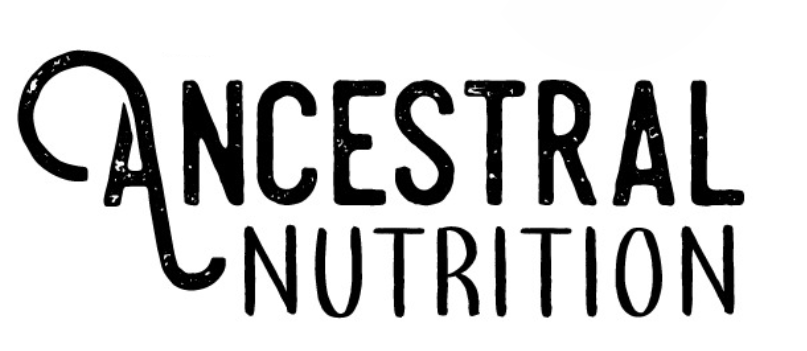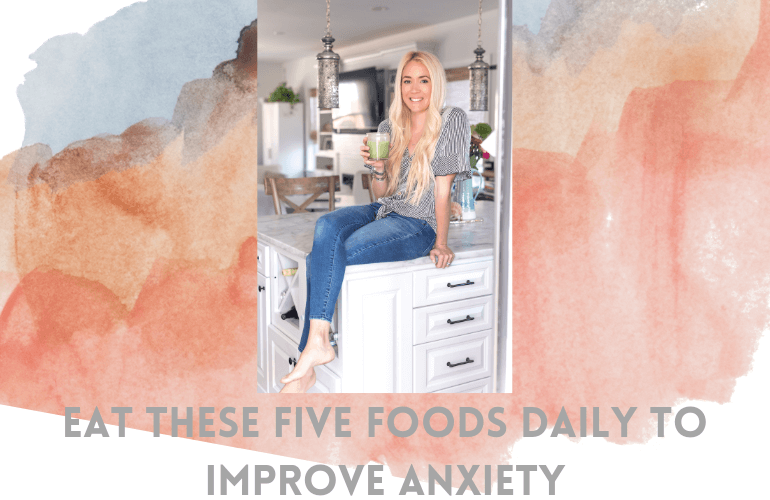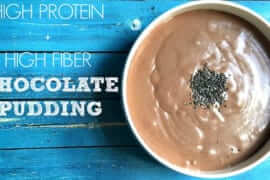I have treated my own anxiety with a combination of exercise, journaling, brain rewiring, meditation, sleep and diet. I eat these five foods daily to improve anxiety and they have made a massive difference in my mood and overall brain function.
Before you think anxiety is just genetic, that you are broken or that something is wrong with you – I’m here to tell you that you are not broken, you are not beyond repair, you are not only worthy of healing – you’re capable of it.
Did you know that what you eat has a profound impact on your mood? Or that the gut is the second brain? Or that even simply dehydration can negatively impact the brain?
Listen, there is SO much you can do to feel better. And for me, that starts with what I’m eating. The gut is the second brain,
Science is just beginning to explore the gut-brain connection, or how the gut affects the brain and vice versa. From Harvard Medical School,
“The brain has a direct effect on the stomach. For example, the very thought of eating can release the stomach’s juices before the food gets there. This connection goes both ways. A troubled intestine can send signals to the brain, just as a troubled brain can send signals to the gut. Therefore, a person’s stomach or intestinal distress can be the cause or the product of anxiety, stress, or depression. That’s because the brain and the gastrointestinal (GI) system are intimately connected — so intimately that they should be viewed as one system.” (emphasis mine)
Eat These Five Foods Daily To Improve Anxiety:
Collagen
Collagen has been so been so incredibly helpful in my healing journey, so much so that I even created my own. There’s a distinct reason for this: collagen heals the gut. Here’s why: the main amino acid in collagen is glycine, and glycine is mainly what the stomach lining is made up of. Therefore when we consume collagen, we’re strengthening the gut lining and healing the gut.
I can’t emphasize enough the critical important of the gut, not just for overall healthy but especially for mental health. Inflammation of the gut directly causes brain inflammation via the vagus nerve.
If you are consuming refined carbohydrates (bread, pasta, packaged junk food, fast food, etc.), sugar, alcohol, rancid vegetable oils (like soy and canola oils) – you are repeatedly wreaking havoc on the gut, and therefore your brain and mood.
My collagen is particularly helpful because I mixed it with six super foods – broccoli, kale, spinach, spirulina, wheatgrass and turmeric. These provide more more nutrition, more antioxidants and overall are extremely anti-inflammatory (especially the turmeric!). It doesn’t hurt that roughly 80% of skin is made up of collagen so it’s also amazing for maintaining healthy, youthful skin.
Fermented Foods/Probiotics
Scientists have confirmed time and again that beneficial gut flora directly improves the mood. This, again, is because the gut and the brain are in constant connection.
In one study, scientists found that giving mice probiotics reversed their autistic symptoms (of which anxiety was one).
A study from the University of Toronto found that supplementing with probiotics in people with chronic fatigue syndrome led to reduced feelings of anxiousness.
In 2011, scientists found that giving people a probiotic for 30 days reduced their depression and anxiety.
A study out of UCLA found that women who ate yogurt twice a day had improvements in the part of the brain that process emotion, and improved anxiety symptoms.
Best fermented foods/probiotics:
- kimchi
- yogurt
- kefir
- kombucha
- sauerkraut
- pickles
- This is one of my favorite probiotic brands, with clinical testing and several strains of bacteria that are beneficial for mood.
Healthy Fats
The brain is made up mostly of fat. The American diet is made up primarily of rancid, oxidized industrial vegetable oils like canola, soy, corn, peanut and cottonseed. Aside from being beneficial for brain health, healthy fat are also beneficial for overall health including heart, skin, cardiovascular system and so much more.
The big issue I see regularly with fat consumption is not just that Americans don’t consume enough healthy fats, it’s that Americans consume the wrong kind of fats. Eating industrialized oils like canola and soy (which make up the bulk of the oils consumed by America) causes inflammation, including brain inflammation. This exacerbates and can even contribute to the formation of mood disorders in the first place. Eat your fats, just make them healthy!
My favorite healthy fats include:
- olive oil
- fish oil
- avocados (not oil, most is rancid – read that article HERE)
- ghee
- grass-fed butter
- coconut oil
- sustainable palm oil
- tallow
Protein
I was plant based from ages 16 to 21. During that time, I relied on beans, legumes, tofu and fake meat for protein. If you’re vegetarian I’m sorry to say: that ain’t gonna cut it.
We need whole proteins from animals, which are bioavailable, nutrient dense and critical for mood management. Here’s why: protein is the precursor for neurotransmitters, neurotranmitters like serotonin and GABA, make us feel calm, happy, relaxed. Without adeqaute protein, this process becomes much more difficult.
My favorite proteins include:
- wild seafood (salmon is so, so great for anxiety sufferers!)
- mollusks – oysters, mussels, clams
- grass-fed beef
- pasture raised poultry
- pasture raised eggs
Alllll the veggies
Vegetable feed the good bacteria in the gut, and as we discussed before, beneficial gut bacteria have a beneficial impact on mood.
Veggies –> better gut health –> better mood
The fiber in vegetables is what the beneficial gut bacteria feed off of, while unhealthy gut bacteria feed off of sugar and refined, processed foods. The more vegetables we eat, the stronger the beneficial gut bacteria grows. In fact, gut dysbiosis, or an overgrowth of unhealthy gut bacteria, has been directly linked to anxiety.
This study from Texas Tech School of Psychiatry found that,
“Dysbiosis and inflammation of the gut have been linked to causing several mental illnesses including anxiety and depression, which are prevalent in society today. Probiotics have the ability to restore normal microbial balance, and therefore have a potential role in the treatment and prevention of anxiety and depression.“
To eat weekly:
- fatty fish like salmon and sardines
- mollusks like clams, mussels and oysters










